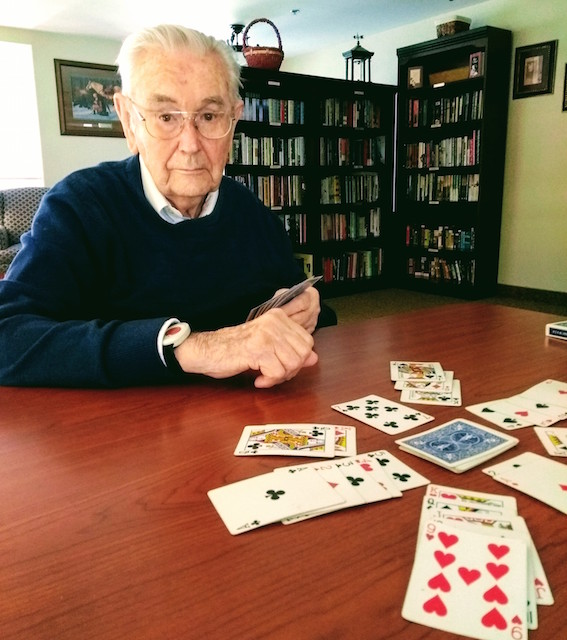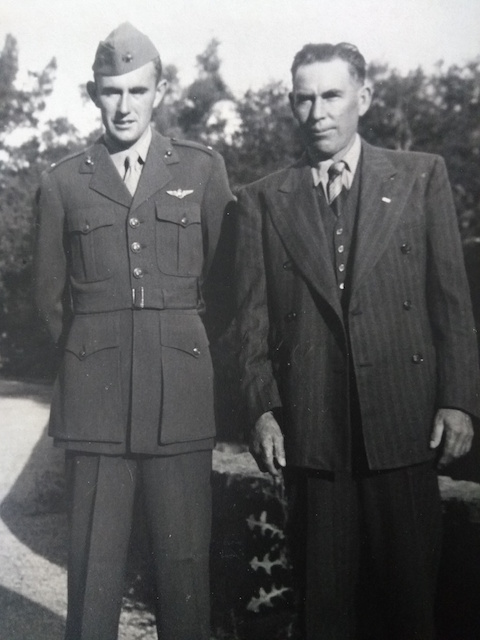
Grandpa gently knocks his 97-year-old knuckles on the table signaling that his turn is finished and I’m up.
Over my left shoulder a handful of women gather around the piano and sing “In the Garden” off-key. I draw a card and lay it down, red on black, descending order in rows, kings in the corners, and begin to tell Grandpa about the novel I’ve been reading.
We’ve been meeting here every Wednesday and Sunday afternoon for the past three months. At 42, I’m the youngest person in the building who isn’t on staff and the only visible visitor at the assisted living center. I’ve stopped coming for lunch, as the food served here tastes like apathy and sadness. With so little else to look forward to in their small lives here, this feels especially unfortunate.
Grandpa doesn’t complain. Never has. Instead, he sings songs in his low Bing Crosby voice while we play cards and tells me endless stories about family, war, love, and loss.

The thing is, whether or not we acknowledge it, all generations are bound together and our pulling apart of this social web is leading to increased feelings of isolation and loneliness across all age groups. With increased separation we begin to see each other as different, subtly dehumanizing one another and breeding mistrust, lack of empathy, and ageism.
Young people learn to keep older adults at a distance and miss out on the kinds of nurturing relationships that they need now more than ever due to families experiencing high divorce rates, economic strain, and geographic mobility. And both young and old are left with fewer opportunities for lifelong contribution to their families and communities.
I was fortunate enough to spend a good portion of my childhood with my grandparents. They taught me most of the valuable, practical information that I have needed throughout my life. I learned how to garden, preserve foods, and make impossibly flaky and light pie crusts.
My grandfather once let me attempt to whittle and I still have the diagonal scar on my left forefinger to prove it. He also taught me how to properly throw a machete so that it would stick into the trunk of their enormous Gravenstein apple tree. We used belts looped through the handles of old plastic milk jugs to go out and harvest blueberries and cherries so that we could have both hands free for picking and climbing up and down ladders.
Other days we would sit opposite each other in giant chairs by the fire and he would let me pummel him with questions for hours. We talked about philosophy, religion, history. When the other adults in my life were busy, distracted, and exhausted, my grandparents always seemed to have an abundance of time and patience.
Though my childhood experience was full of these kinds of intergenerational interactions, it’s a reality that is sadly becoming more and more scarce. The elderly mostly reside in assisted living centers while many retirees opt to live in 55+ communities. School children are in classes and groups segregated by age, often spending their free time in structured activities that offer the same. Multi-generational housing, apprenticeships, farming, and other family businesses that used to necessitate exchange among different generations is dwindling.
Research has shown that children who do spend time with older adults develop a stronger sense of empathy, improve learning and attainment of goals, and gain a more realistic view of aging. Older adults who participate in intergenerational programs demonstrate improved cognition, physical ability, and mental health. These programs also prompt all involved to acknowledge our shared fate increasing the likelihood of cooperation and civic engagement.
So how can we begin to reverse this trend that has carved deep divides in our society for more than a century? There are a variety of programs, which depend on volunteers sharing skills and training to fulfill community needs. Volunteers work in nursing homes, libraries, and community centers. They deliver meals to those in need. Co-locating services are creating spaces that house both nursing homes, early childhood education, and childcare services.
A personal favorite I found while writing this is the L.A. Kitchen, a space dedicated to a variety of programs that reduce food waste, train students who have been formerly incarcerated, homeless, or in foster care, and provide low income elders with healthy meals. Food is indeed a powerful way to connect and heal these divides.
Currently, I’m living in a rural area of Portugal sprinkled with small villages and farms. Though many of the young adults have moved to the cities for work, leaving the elderly behind, there are still many events in each village where all ages gather. One of my favorites is a monthly market in which large tables are placed in the center square and everyone gathers to eat, gossip, laugh, drink, and catch up.
It’s around tables like these where I learn of old traditions and stories, where I pick up bits and pieces of this language that still feels so awkward in my mouth, and where I become acquainted with my new neighbors and friends.
And maybe there are ways that each of us can begin to foster these relationships, find common ground, listen, and be more curious. For me, it started with a longer than anticipated visit home and a few months to sit with my grandfather. I reacquainted myself with my childhood champion, met his friends who became my friends, and learned that he’s not so different than he was more than 30 years ago.
A couple of weeks ago Grandpa and I met for our last Wednesday afternoon card game. The next day I would leave for Portugal. For 97 he’s in great shape, but little is guaranteed at this age and each time we say goodbye could very well be our last.
I kneel down to be at eye level with him in his wheelchair and feel my chest fill with little, taunt rubber bands. I tell him that I love and appreciate him. He smiles, pats my hand and says, “Alright then. So long for now, kiddo.”
So long, Gramps.
~
Relephant:
Our Children are Missing out on their Grandparents.
What our Grandparents Knew.
~
Author: Heidi Dyer
Image: Author’s own
Editor: Kenni Linden
Copy Editor: Catherine Monkman








Read 2 comments and reply